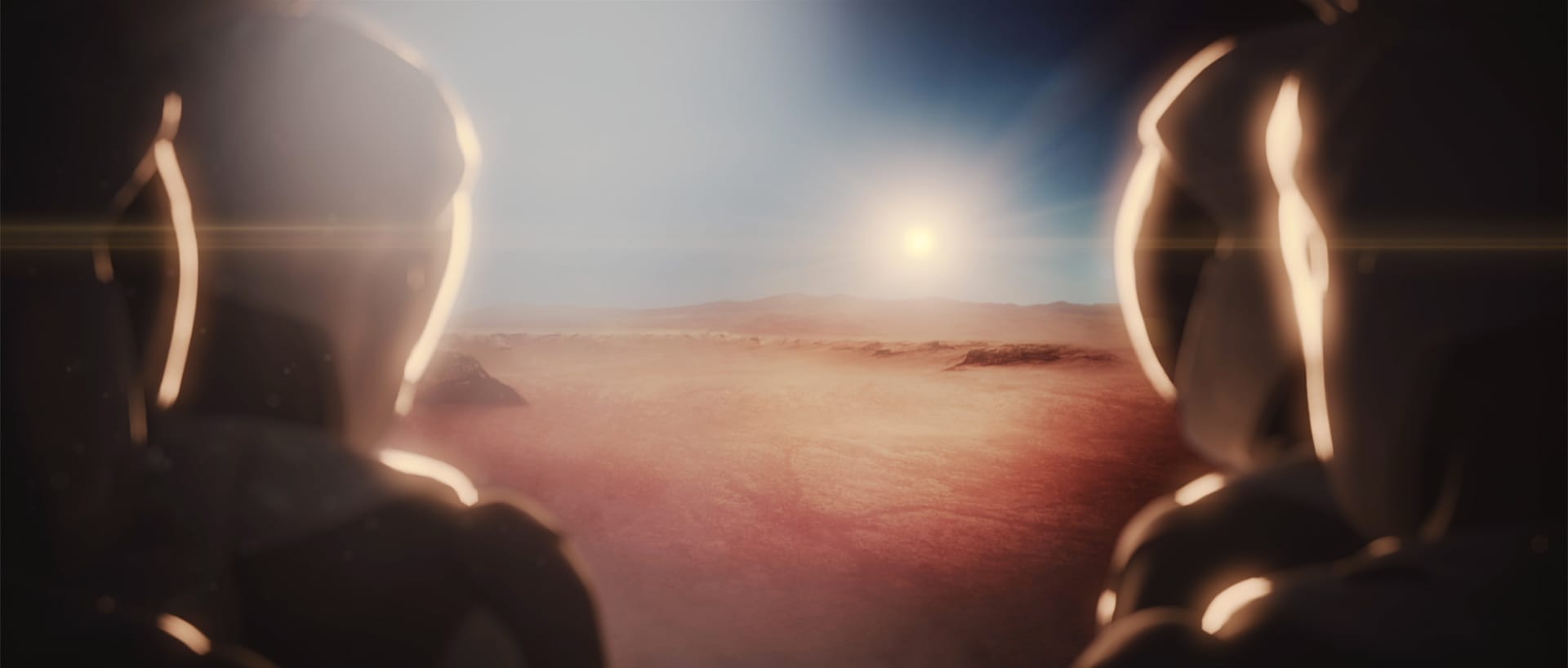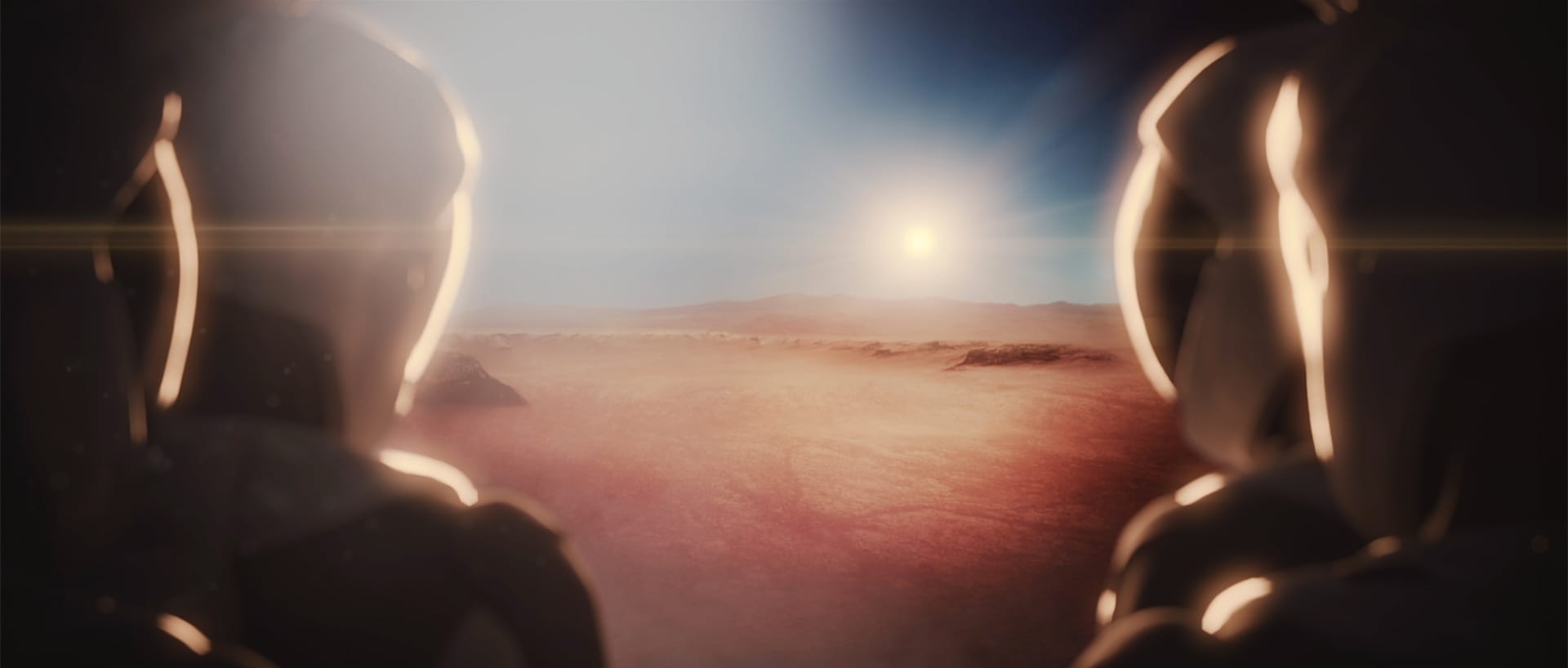
How we think about the future is all too often shaped by science fiction stories set many years or centuries from now — and it certainly helps when some of the most powerful people in our society feel it’s their duty to try to bring those visions to life. They don’t question what the future should be — in their view, that’s already been laid out — the only real question is how to achieve it.
Some of the most influential visions we’re presented are Elon Musk and Jeff Bezos’ sci-fi-inspired plans to bring humanity into space, either by colonizing Mars or sticking us in vast space colonies in Earth’s orbit. While both billionaires have a wide range of space-age stories driving them forward, Musk is more a devotee of Douglas Adams’ Hitchhiker’s Guide to the Galaxy, seemingly unable to see how its themes run counter to his entire project, while Bezos has long been enamored by Star Trek, even though he has a much more capitalistic space future as his ultimate goal.
The tech founders claiming to make science fiction a reality go far beyond them though. Mark Zuckerberg claimed a few years ago he was going to built the metaverse from Neal Stephenson’s Snow Crash and Ernest Cline’s Ready Player One, while OpenAI’s Sam Altman has called artificial general intelligence — the idea that computers will one day match or surpass the capabilities of the human brain — his “sci-fi AI dream.” And there are plenty of other companies seeking to make humanoid robots, holographic interfaces, self-driving cars, life-extending technologies, and ugly vehicles like the Cybertruck because of things their creators saw or read in some science fiction property in decades past.
But what if tech billionaires are using those stories to lead us astray? If those futures can never be achieved — or shouldn’t because they were pulled out of dystopian tales — what does it mean for our societies to be putting so much energy and resources behind projects that try to bring them to life? It’s a decision that could have serious consequences for the vast majority of people on the planet who are not billionaires.
The business behind the fantasy
I don’t think there’s any doubt that the Musks and Zuckerbergs of the world have a passion for science fiction. But under capitalism, pointing to those stories allows them to tap into investors’ excitement to help get backing for a business venture and set a narrative that their companies are bringing the future into being. In other words, that what the tech founder is trying to achieve is inevitable and no one should bother trying to stand in their way. That’s become quite a common narrative in Silicon Valley.
The excitement about the future also helps distract the media and the public from more immediate concerns and harms. As journalist Kara Swisher explained in her recent memoir, she was willing to let tech billionaires off with unethical behavior as long as she thought they were helping move the world forward. She called it her “prick to productivity ratio.” Even today, after publicly breaking with Musk (because he broke with her first), she will still say she wishes he’d stop sharing fascist conspiracy theories (my words) because he’s done such amazing things with electric cars and rocket ships.
Kara Swisher’s Reality Distortion Field
Swisher isn’t alone in this. For years, SpaceX has received breathless coverage for reducing the cost of rocket launches and helping to weave a narrative that got the public reengaged on space exploration. More importantly for the company, it also got the government to open its coffers and provide it with very lucrative contracts to fund its operations. But along the way the enthusiasm that narrative created enabled Musk to get away with subjecting workers to long hours and immense pressure, as described by Walter Isaacson in his recent biography and which Reuters found contributed to hundreds of workplace injuries. That’s on top of the growing environmental damage the company is causing in protected wildlife areas in southern Texas, along with the lawsuits alleging of sexism and ageism at SpaceX, the firing of employees critical of Musk, and the accusations of sexual harassment by Musk toward a SpaceX airline attendant.
Even as Musk was found to be cutting off Ukraine’s access to SpaceX’s Starlink satellite internet service because he was taking calls from Russian officials, the US military was unable to do much about it because they’ve become so dependent on SpaceX’s rocket launch capabilities. Instead of being punished for any of that, the military negotiated a contract to pay SpaceX more money for the Starlink service it was providing in Ukraine and a US intelligence agency gave it a contract to build a spy satellite network. And that’s just the tip of the iceberg.
The deceptive story Musk told was key to getting his companies past initial hurdles and himself to the position he’s in today. With SpaceX specifically, it was the idea that the thrust of the business was to achieve the sci-fi vision of setting the foundation for Mars colonization in the short term as a stepping stone to turning humanity into a multiplanetary civilization in the long term. In reality, the company’s real business model was to use that story (paired with some key lawsuits) to get the US government and NASA to provide it with public contracts that would eventually allow it to dominate US rocket launch capabilities and crowd other companies out of low-earth orbit with its Starlink satellites — the space activities that can actually turn a profit.
Meanwhile, just like with his deadlines for self-driving cars, the grand vision continues to recede farther into the future. In 2011, Musk said he’d likely have a man on the moon in ten years. That deadline came and went, only for him to tell Lex Fridman in 2021 that it would take five more years to put a person on Mars, or ten years in the worst case scenario. In 2023, he issued the ten-year timeline all over again — but you can be certain he won’t achieve it. Even the Artemis 3 moon mission that relies on a NASA-contracted vehicle from SpaceX has had to be pushed because the company hasn’t been able to deliver on time.
Science fiction isn’t prediction
If you listen to the libertarians pushing the notion of space settlement, you could be tricked into believing that Mars is some kind of distant paradise-in-the-making that we need only seize and remake for our species. As the crises escalate here on planet Earth, the solution isn’t to do all we can to make a world that works for all, but to find a new frontier that will magically cure all of our ills. Except there isn’t an ounce of truth in those stories.
Mars is no backup planet. It’s a hostile world where humans can’t breathe without technological assistance, can’t walk freely on the surface without a space suit, and would have to live far underground to avoid developing cancer from the radiation on the surface since the world has no magnetosphere. As Zach and Kelly Weinersmith explain in A City on Mars, the soil on Mars is toxic and not as easy to clean as boosters of space settlement like to suggest. There’s also very little research on the social and biological considerations of long-term habitation in space, particularly reproduction and child rearing in a hostile environment that lacks the gravity we’ve evolved to live with. And that’s before considering the legal questions that people like Musk pretend don’t exist.
There’s no future for humanity in space — or at least not for such a long time that it’s pointless to make sacrifices to try to realize it in the present. Intergalactic travel and adaptation to different planets seems easy in science fiction because the challenges can be ignored or explained away so as not to get in the way of the story — and there’s nothing wrong with that. Science fiction’s job isn’t to predict the future, but to use an imagined universe as a setting to probe the problems of the present. Renowned science fiction author Ursula K. Le Guin put this well in a 1985 essay called “Science Fiction and the Future.”
When we look at what we can’t see, what we do see is the stuff inside our heads. Our thoughts and our dreams, the good ones and the bad ones. And it seems to me that when science fiction is really doing its job that’s exactly what it’s dealing with. Not “the future.” It’s when we confuse our dreams and ideas with the non-dream world that we’re in trouble, when we think the future is a place we own. Then we succumb to wishful thinking and escapism, and our science fiction gets megalomania and thinks that instead of being fiction it’s prediction.
Le Guin explicitly rejects many of the stories that inspire our modern-day space billionaires, where “space and the future are synonymous: they are a place we are going to get to, invade, colonize, exploit, and suburbanize.” Rereading that essay, I couldn’t help but think about the concept of longtermism: a worldview that justifies the mass accumulation of wealth by people like Musk and Bezos so they can invest in realizing their childhood dreams of space colonization, while giving themselves a framework to try to sell it as a moral act to safeguard humanity’s future even as homelessness, poverty, hunger, and war continue to be serious crises plaguing far too many of our fellow humans — in part because so few have hoarded so much and seek to preserve their wealth and power at all costs.
Why Silicon Valley is bringing eugenics back
The billionaires’ ability to sell such an unethical project depends on getting people to buy into the fantasy that humanity’s future is in space — a project often pushed by popular culture, industry, and government. But just because there are powerful interests behind the idea doesn’t mean it’s technically or scientifically feasible, no matter how attractive it can be made to sound if you ignore the mountain of barriers to realizing it.
Our future is not in space
I’m skeptical that humans will ever establish thriving communities on another planet, moon, or any other celestial body beyond Earth. We’ve evolved over hundreds of thousands of years to be adapted to the conditions of this one world, and I don’t believe we could easily adjust ourselves to the hostile conditions presented by literally anywhere else we could reasonably hope to go. There may one day be small outposts on the Moon or even Mars, similar to the International Space Station, but I have a hard time believing they’ll be anything more than that. Space exploration will continue to be done by probes, rovers, and other technology we send into the cosmos to transmit data back to us — not by humans making long journeys to faraway celestial bodies.
As Elon Musk sells us the idea that our future is in space and gets the government to believe it so his company can get billion-dollar contracts, the dream distracts us from the conversation we really should be having: what it would mean to address the serious problems we face in the here and now, and to set the foundations of a better society on Earth regardless of what happens beyond our atmosphere. Instead, Musk has effectively captured our imaginations to serve his own personal and business interests, and in the process not only diverted resources toward himself, but used a false future to trample over workers, communities, and the environment.
What would it look like to build a future on Earth that addresses the climate crisis, heals the harm humanity has caused to the planet, and ensures a good life for all where no one has to struggle for food, spend a night without a roof over their head, or hide in terror from bombs and occupying soldiers? For Musk, this is less “exciting and interesting” than being a multiplanetary species, and it’s essentially an acceptance of “stasis and rationing” in Bezos’ mind. But just because the sci-fi-loving billionaires say that doesn’t mean it’s true.
Over the past few decades, our collective ability to conceive of a political movement that would radically alter the current state of affairs feels to have waned, giving people like Musk and Bezos the room to move in with fantastic visions that benefit themselves. Fredric Jameson wrote that it was easier to imagine the end of the world than the end of capitalism, and until that changes we’ll be left chasing the childhood dreams of billionaires at the expense of a better life for everyone else.





Member discussion